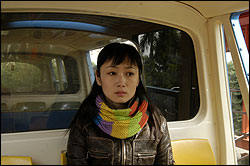It takes a rotting Communist kleptocracy to build one of the great movie sets of all time in The World (which runs Wed., Sept. 9–Thurs., Sept. 15, at the Varsity). “The World” of Jia Zhang-ke’s somewhat unfocused, melancholy romance is a huge, garish theme park near Beijing, a real place built for mainland tourists who can’t afford—or get passports—to see the real thing. Monuments and signature buildings from around the globe are reproduced so that families can take pictures of themselves at a one-third-size Eiffel Tower or a St. Peter’s Basilica that’s about as large as a tennis court or a Venice that could be flooded by a bathtub. When one of the costumed park performers says, “I’m going to Japan,” it means hopping on a rickety blue monorail—that’s right, Seattle, your transportation system of the future, a tourist ride—to another quadrant of the park. Bypassing tiny pyramids, complete with a rather bored looking camel, one arrives at a place of pagodas and temples where Tao (Zhao Tao) and her fellow showgirls don kimonos and smile for the visitors.
Tao represents herself as the girlfriend of park security guard Taisheng (Chen Taishen), but he and the viewer both have reason to be skeptical. She won’t sleep with him, and it’s more like he’s the symbol of a boyfriend, like the replica of Big Ben. Taisheng, not surprisingly, wants a real girlfriend with some real passion, even though he seems to be dealing fake ID papers for some low-level gamblers. He comes to prefer Qun, a more worldly fashion designer—even though she’s planning to join her husband in France. Meanwhile, Tao’s ex is also heading abroad. As in Jia’s breakthrough, Platform (see DVD of the Week), there’s a sense of longing for a better life at some unreachable distance, one made bitterly ironic by all the fake tourist icons. The park’s cheerful slogan, “See the world without ever leaving Beijing,” sounds more like a prison sentence for Tao, Taisheng, and their co-workers.
There are other stories here, too: another dancer and her jealous boyfriend; Taisheng’s cousins from the sticks who arrive to take dangerous construction jobs; some unclear stuff about the gamblers and phony IDs; a Russian woman performing at the park who bonds with Tao; and a chorus girl who advances to management by sleeping with the boss. None of it is terribly novel (a bit of neorealism here, a bit of 42nd Street there), and all of it is overpowered by the central metaphor of The World. Jia and his story can’t escape the simulacrum of the amusement park; he can’t decide what to do with the idea of this hollow substitute that mocks and frustrates its inhabitants.
None of the actors or chapters really stand out. You’d like to care more about Tao and Taisheng, but the performances don’t work. She starts out brassy and bold in a bravura long-take sequence that opens the movie, the camera snaking between sequined showgirls just before they go onstage. (You can’t help thinking Jia has watched his pirated DVDs of Boogie Nights and GoodFellas a few too many times.) Then she becomes gloomy and needy for the rest of the picture. Taisheng’s all smiles with her, begging and beseeching; then he smokes and dresses like a hoodlum outside the park, yet without robbing any banks or roughing anyone up. As with Platform, everyone’s just waiting, waiting, waiting.
The World is more a mood piece than an artwork (unlike Platform)—the feelings are real, even if the place isn’t. Jia could’ve made a fine documentary about “The World” (especially with those Vegas-style stage shows) or perhaps concentrated on writing a better romance or perhaps expanded the rather charming animated interludes in which cell phones and text messaging lead to dreams of flying above Beijing, like CG Chagall. The World isn’t a failure, but it contains too much territory for Jia to map. He and other members of China’s Sixth Generation filmmakers are facing both the vastness of China’s rapid commercialization and the strictures of its fascist government.
The best recent Chinese pictures to deal with this grim present reality, as opposed to your mythic eye-candy like Hero and House of Flying Daggers, have been chopstick noirs, like Li Yang’s Blind Shaft and Lou Ye’s Suzhou River. They’re boiled down and specific—one place, one crime, one set of problems and characters. Jia seemingly has a lifetime’s supply of ineffable sadness to work with. Now he needs to build something concrete with it.








